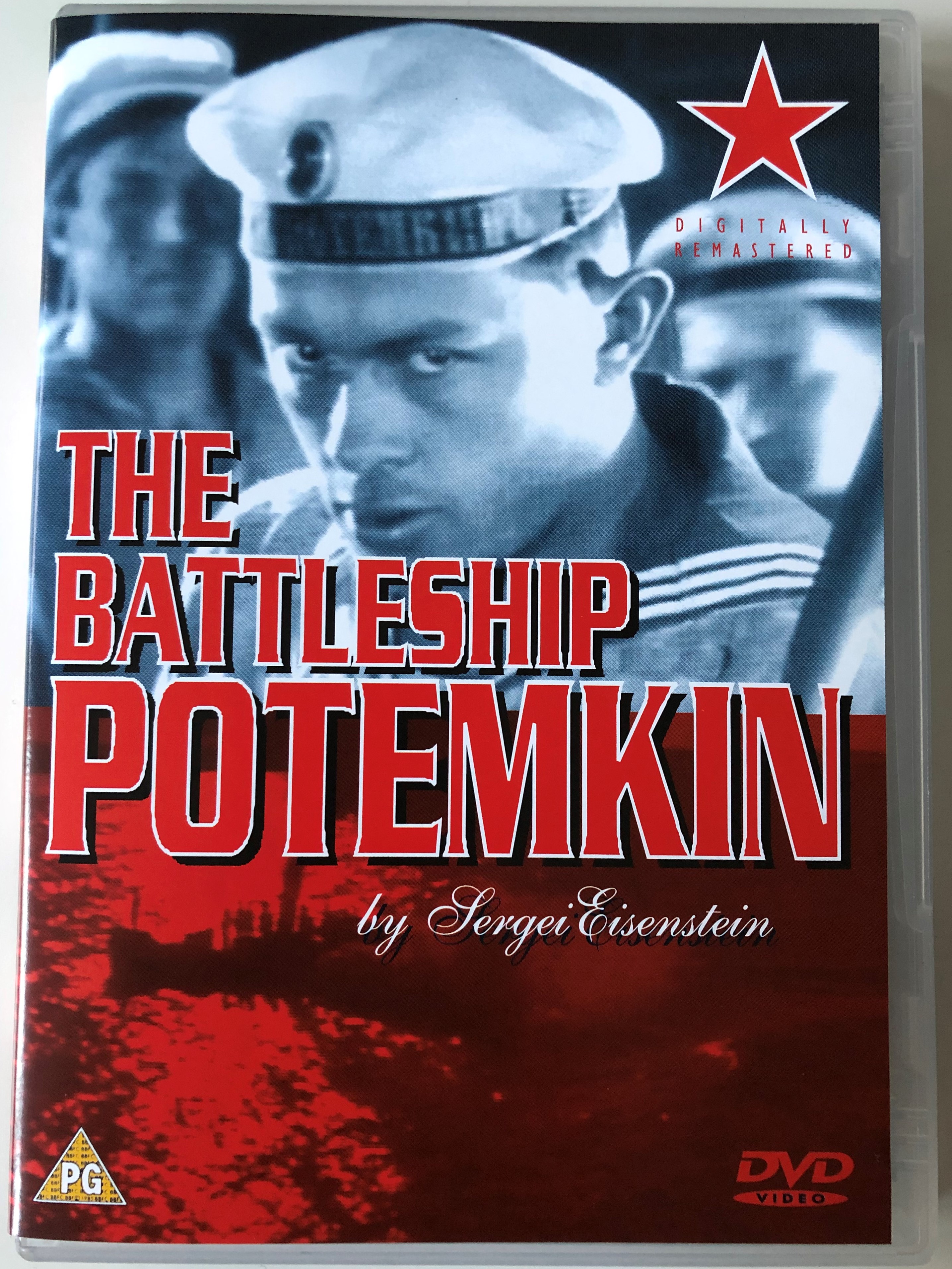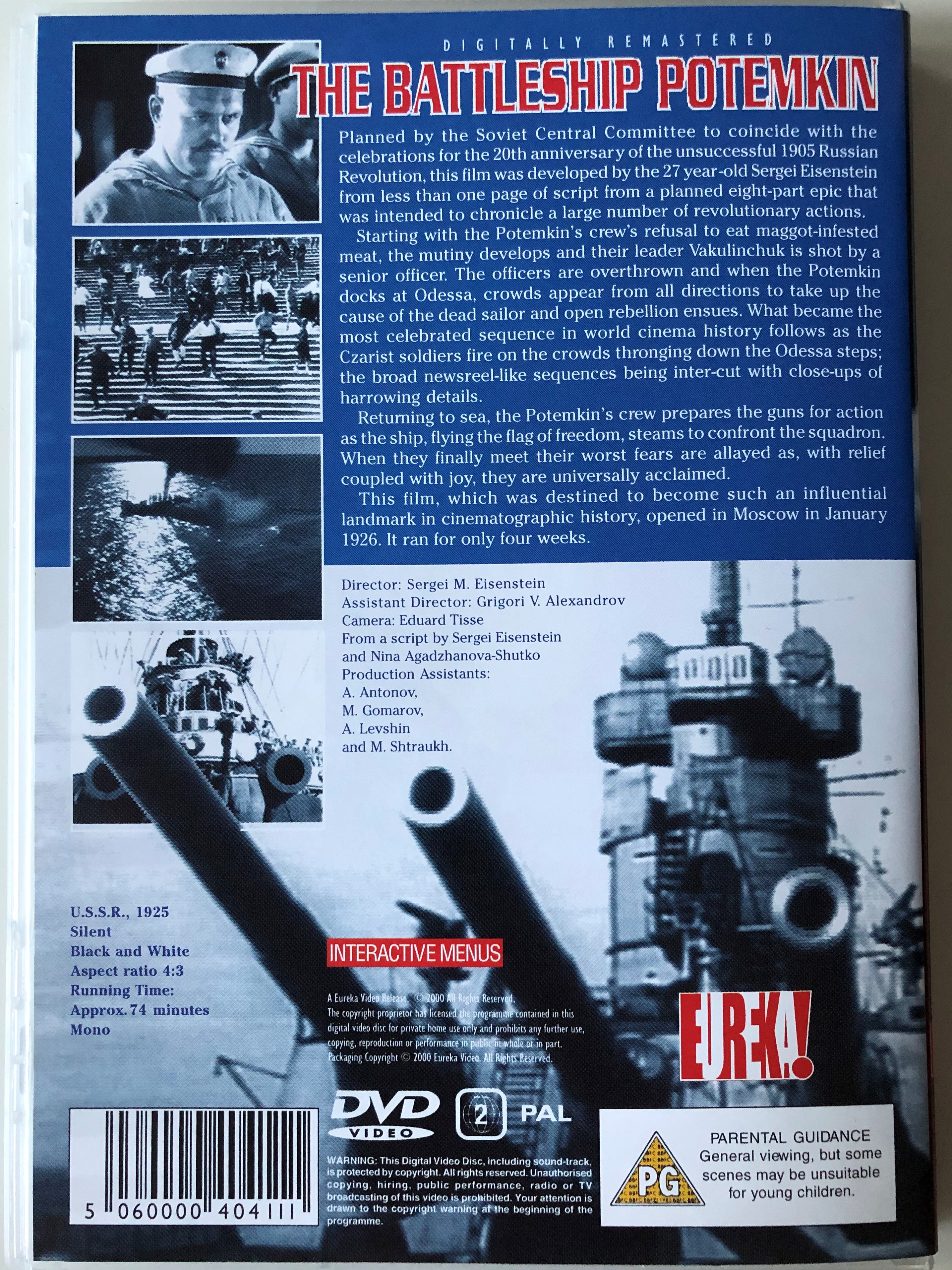Description
The Battleship Potemkin DVD 1925 / Directed by Sergei M. Eisenstein / Starring: Aleksandr Antonov, Vladimir Barksy, Grigori Aleksandrov / Silent Black and White film / Digitally Remastered
UPC 5060000404111
MADE IN USSR
REGION 2 PAL DVD
Audio: Silent / Mono
Subtitles:
Total Runtime: 74 minutes
English Summary:
Battleship Potemkin (Russian: Бронено́сец «Потёмкин», Bronenosets Potyomkin), sometimes rendered as Battleship Potyomkin, is a 1925 Soviet silent film directed by Sergei Eisenstein and produced by Mosfilm. It presents a dramatized version of the mutiny that occurred in 1905 when the crew of the Russian battleship Potemkin rebelled against its officers.
Battleship Potemkin was named the greatest film of all time at the Brussels World's Fair in 1958.[1][2][3] In 2012, the British Film Institute named it the eleventh-greatest film of all time.
The film is set in June 1905; the protagonists of the film are the members of the crew of the Potemkin, a battleship of the Imperial Russian Navy's Black Sea Fleet. Eisenstein divided the plot into five acts, each with its own title:
Act I: Men and Maggots
The scene begins with two sailors, Matyushenko and Vakulinchuk, discussing the need for the crew of the Potemkin to support the revolution taking place within Russia. While the Potemkin is anchored off the island of Tendra, off-duty sailors are sleeping in their bunks. As an officer inspects the quarters, he stumbles and takes out his aggression on a sleeping sailor. The ruckus causes Vakulinchuk to awake, and he gives a speech to the men as they come to. Vakulinchuk says, "Comrades! The time has come when we too must speak out. Why wait? All of Russia has risen! Are we to be the last?" The scene cuts to morning above deck, where sailors are remarking on the poor quality of the meat for the crew. The meat appears to be rotten and covered in worms, and the sailors say that "even a dog wouldn't eat this!" The ship's doctor, Smirnov, is called over to inspect the meat by the captain. Rather than worms, the doctor says that the insects are maggots, and they can be washed off before cooking. The sailors further complain about the poor quality of the rations, but the doctor declares the meat edible and ends the discussion. Senior officer Giliarovsky forces the sailors still looking over the rotten meat to leave the area, and the cook begins to prepare borscht although he too questions the quality of the meat. The crew refuses to eat the borscht, instead choosing bread and water, and canned goods. While cleaning dishes, one of the sailors sees an inscription on a plate which reads "give us this day our daily bread". After considering the meaning of this phrase, the sailor smashes the plate and the scene ends.
Act II: Drama on the Deck
All those who refuse the meat are judged guilty of insubordination and are brought to the fore-deck where they receive religious last rites. The sailors are obliged to kneel and a canvas cover is thrown over them as a firing squad marches onto the deck. The First Officer gives the order to fire, but in response to Vakulinchuk's pleas the sailors in the firing squad lower their rifles and the uprising begins. The sailors overwhelm the outnumbered officers and take control of the ship. The officers are thrown overboard, the ship's priest is dragged out of hiding, and finally the doctor is thrown into the ocean as 'food for the worms'. The mutiny is successful but Vakulinchuk, the charismatic leader of the rebels, is killed.
Act III: A Dead Man Calls Out
The Potemkin arrives at the port of Odessa. Vakulinchuk's body is taken ashore and displayed publicly by his companions in a tent with a sign on his chest that says "For a spoonful of borscht" (Изъ-за ложки борща). The citizens of Odessa, saddened yet empowered by Vakulinchuk's sacrifice, are soon whipped into a frenzy against the Tsar and his government by sympathizers. A man allied with the government tries to turn the citizens' fury against the Jews, but he is quickly shouted down and beaten by the people. The sailors gather to make a final farewell and praise Vakulinchuk as a hero. The people of Odessa welcome the sailors, but they attract the police as they mobilize against the government.
Act IV: The Odessa Steps
The best-known sequence of the film is set on the Odessa steps, connecting the waterfront with the central city. The citizenry of Odessa take to their ships and boats, sailing out to the Potemkin to show their support to the sailors and donate supplies, while a crowd of others gathers at the Odessa steps to witness the happenings and cheer on the rebels. Suddenly a detachment of dismounted Cossacks form battle lines at the top of the steps and march toward a crowd of unarmed civilians including women and children, and begin firing and advancing with fixed bayonets. Every now and again, the soldiers halt to fire a volley into the crowd before continuing their impersonal, machine-like assault down the stairs, ignoring the people's pleas for humanity and understanding. Meanwhile, government cavalry attack the fleeing crowd at the bottom of the steps as well, cutting down many of those who survived the dismounted assault. Brief sequences show individuals among the people fleeing or falling, a baby carriage rolling down the steps, a woman shot in the face, broken glasses, and the high boots of the soldiers moving in unison.
In retaliation the sailors of the Potemkin decide to use the guns of the battleship to fire on the city opera house, where Tsarist military leaders are convening a meeting. Meanwhile, there is news that a squadron of loyal warships is coming to quell the revolt of the Potemkin.
Act V: One Against All
The sailors of the Potemkin decide to take the battleship out from the port of Odessa to face the fleet of the Tsar. Just when battle seems inevitable, the sailors of the Tsarist squadron refuse to open fire, cheering and shouting to show solidarity with the mutineers and allowing the Potemkin, flying the red flag, to pass between their ships.
Russian Summary:
«Бронено́сец „Потёмкин“» — немой исторический художественный фильм, снятый режиссёром Сергеем Эйзенштейном на первой кинофабрике «Госкино» в 1925 году. Неоднократно в разные годы признавался лучшим или одним из лучших фильмов всех времён и народов по итогам опросов критиков, кинорежиссёров и публики
Июнь 1905 года, Российская империя. Матросы одного из броненосцев Черноморского флота, стоящего на рейде Одессы, взбунтовались из-за того, что их пытались накормить червивым мясом. Зачинщики бунта приговариваются к расстрелу. Однако во время исполнения казни остальные матросы бросаются им на выручку. Офицеров корабля выбрасывают за борт, но вдохновитель восстания матрос Вакуленчук гибнет в схватке.
Население Одессы стекается на похороны Вакуленчука и поддерживает команду революционного корабля. Вызванные правительственные войска безжалостно расстреливают мирных жителей на знаменитой одесской лестнице. На подавление восстания направляется Черноморская эскадра, но матросы отказываются стрелять по восставшим, и броненосец «Потёмкин» проходит через строй кораблей.
В финале третьего акта фильма на мачте броненосца развевается поднятый восставшими красный флаг. Заканчивается картина кадром, на котором броненосец будто бы «выплывает из фильма» в зал.
Cast
- Aleksandr Antonov as Grigory Vakulinchuk (Bolshevik sailor)
- Vladimir Barsky as Commander Golikov
- Grigori Aleksandrov as Chief Officer Giliarovsky
- I. Bobrov as Young sailor flogged while sleeping
- Mikhail Gomorov as Militant sailor
- Aleksandr Levshin as Petty Officer
- N. Poltavseva as Woman with pince-nez
- Lyrkean Makeon as the Masked Man
- Konstantin Feldman as Student agitator
- Beatrice Vitoldi as Woman with the baby carriage
| Directed by | Sergei Eisenstein |
|---|---|
| Produced by | Jacob Bliokh |
| Written by |
|
| Starring |
|
| Music by |
|
| Cinematography |
|
| Edited by |
|
|
Production
company |
|
| Distributed by | Goskino |
|
Release date
|
|
|
Running time
|
74 minutes |
| Country | Soviet Union |
| Language |
|























